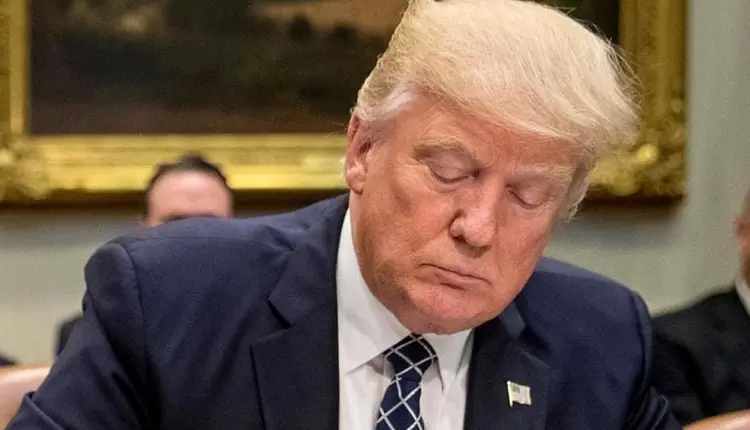Washington: US President Donald Trump has sent a strong message to American courts, asking them to uphold the International Emergency Economic Powers Act (IEEPA), a law from the Cold War that he has used to impose high tariffs on nations, including a 50% duty on India. Trump asserted in a scathing post on Truth Social on Friday that his tariff policy is generating previously unheard-of economic gains. He also issued a warning that any court decision that invalidates his use of IEEPA could send the US into a devastating economic slump akin to the Great Depression of 1929. Fears of a significant setback to Trump’s economic agenda are heightened by the comments, which coincide with mounting legal challenges to his aggressive trade strategy.
Trump boasted of the impact of tariffs, a tactic he has used on numerous occasions to defend them by pointing to economic and national security risks under IEEPA. The stock market is benefiting greatly from tariffs. New records are being set almost daily. “Our nation’s finances are receiving hundreds of billions of dollars,” he wrote on Truth Social. He maintained that in order to safeguard American industries and restore global trade equilibrium, the tariffs — which include a 25% baseline duty that goes into effect on August 7 and an extra 25% penalty on India for its trade with Russia — are necessary. His policies, however, have caused a great deal of worry; detractors have warned of supply chain disruptions, inflation, and strained ties with important allies like India.
The President issued a clear warning to the judiciary. “It would be 1929 all over again — a GREAT DEPRESSION — if a Radical Left Court rules against America’s wealth, strength, and power!” Trump said, alluding to the 1929 stock market crash that set off a ten-year global economic crisis characterised by bank failures, widespread unemployment, and a decline in trade and industrial production. “There would be no way America could recover from such a judicial tragedy,” he added, arguing that any negative decision at this point would ruin the US economy. Trump emphasised that such a decision should have been made sooner to prevent compromising economic momentum, while expressing faith in the US legal system.
Enacted in 1977, the IEEPA gives the president extensive authority to control international trade in the event of a declared national emergency. Using it, Trump has imposed tariffs on nations with significant trade deficits, such as a baseline tariff of 10% on all countries that took effect on April 5, 2025, and higher rates for certain nations like China (30%), Vietnam (20%), and India. But his unique application of IEEPA to tariffs — which has traditionally been used for asset freezes and sanctions— has come under heavy fire. Legal experts contend that implementing IEEPA in trade policy goes beyond its intended scope and violates Congress’s authority to set tariffs under the US Constitution.
Trump’s tariffs have been challenged in at least seven cases, including V.O.S. Selections, Inc. v. United States and Oregon v. Department of Homeland Security. Courts have ruled that the tariffs are unlawful because they go beyond the scope of IEEPA. Citing the tariffs’ lack of a legitimate emergency and their violation of the nondelegation doctrine — which restricts Congress’s ability to delegate its powers — the US Court of International Trade (CIT) ruled in May 2025 that the tariffs were unconstitutional. A district court in Washington, DC, went one step further and declared that IEEPA does not permit tariffs at all. The tariffs are still in place and are causing uncertainty for international trade even though these decisions are on hold while appeals are heard by the US Court of Appeals for the Federal Circuit on July 31.
Prime Minister Narendra Modi of India, a significant strategic ally of the United States, has responded forcefully to the 50% tariff, promising to defend dairy and agricultural producers. The interests of Indian farmers, dairy farmers, and fishers will never be compromised. Modi stated, “I am prepared to pay a heavy price,” indicating a firm stance in the ongoing trade negotiations. Growing tensions are reflected in posts on X, where some users point to Trump’s assertion that India’s high tariffs on US goods support his actions. Others interpret the move as retaliation for India’s participation in BRICS and its ties to Russia.
According to economists, Trump’s tariffs on $2.3 trillion worth of US imports could raise household expenses by $1,300 a year and put the country at risk of stagflation, which is a combination of high inflation and slow growth. Trump brought up the 1929 Great Depression, which caused a sharp decline in international trade and a sharp rise in unemployment, altering economies for decades. With allies like the EU and Japan obtaining lower rates (15%) while India faces harsher penalties, critics, including former US trade negotiator Wendy Cutler, contend that the tariffs disrupt supply chains and could derail trade negotiations.
Trump’s tariff gamble is at risk as the legal battle moves closer to a possible Supreme Court showdown. The outcome will influence US trade policy and its international partnerships, as India and other countries are vying for exemptions and the US economy is displaying signs of stress, as evidenced by a recent hiring slowdown reported by the Bureau of Labour Statistics. Trump’s dire economic predictions highlight the importance of his America First agenda, but it is still unclear if the courts will support or overturn his tariff system.



Comments are closed.